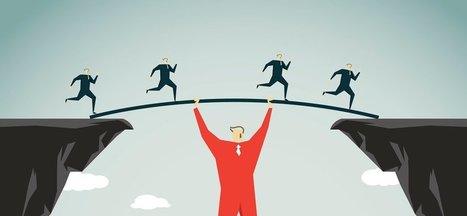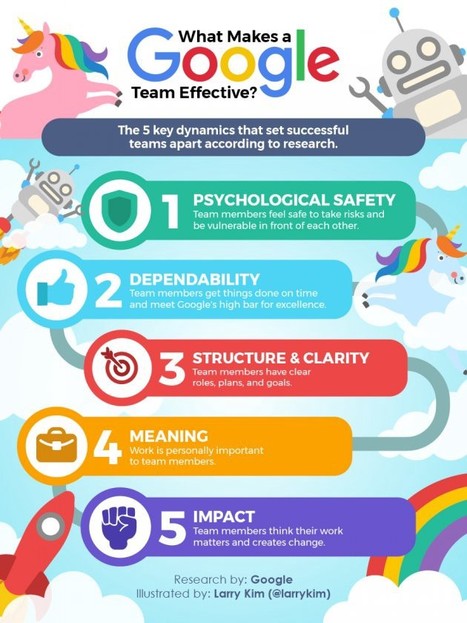 Your new post is loading...
 Your new post is loading...
While it's relatively easy for competitors to implement technology similar to yours, duplicate your strategy, and even mimic your culture, they can't clone your people. That's why most organizations agree talent is a top priority. At the end of the day, people are your truest form of sustainable competitive advantage. To expand the capabilities of their best asset, most organizations invest in some form of continued development. Research from the Brandon Hall Group revealed the average training budget for large organizations hovers around $13 million. Also, out of all the delivery mediums available (i.e., mobile apps, simulations, and e-learning), classroom settings are still chosen 22 percent more often than any other modality. This research came as a bit of a surprise, given all the advancements in technology. Although the study also indicated classroom settings were effective, I couldn't help but think that many companies are behind the times. As a part of the research, Rallyware, a training platform that delivers adaptive learning solutions, interviewed learning and development thought leaders to get their perspective on how technology will shape the future of corporate training. Through these interviews, five e-learning trends emerged: 1. Employees will learn on the go. I'm not the only one who says yes to projects that I'm not 100 percent certain I can do, right? My motto is say yes and figure it out later. It's risky, but it's also a lot of fun. I can't tell you how many times a YouTube video or an on-demand course from Lynda.com has saved me. Kevin Delaney, VP of learning and development at LinkedIn, realizes that future corporate training must adopt to these types of situations. Two-day workshops aren't efficient enough. We need access to just-in-time solutions that help us troubleshoot issues within minutes. In his interview, Delaney offered valuable insight that foreshadows future learning tools: When employees are stuck, they want the answer quickly. It doesn't help them to sign up for a class that will happen three weeks from now and sit through a four-hour session to get the answer they need this minute. They are more inclined to engage in learning if they can watch a short video that they have access to 24/7 on any device. 2. The learning experience will be highly customized. Different learning styles and varying role responsibilities are making big-box, off-the-shelf learning solutions less and less effective. Now, customized and concentrated learning experiences are critical. Employees need access to content that's relevant, easily digestible, and engaging. Delaney offered some opinions on how personalized training should be delivered: First, don't bore people. Bored people don't learn. Second, there is no one-size-fits-all approach to learning. Companies need to offer a variety of solutions and focus on creating a one-size-fits-one experience. 3. Learning and development professionals won't create but curate. The amount of content on the web is unbelievable. Udemy, an e-learning provider, has more than 65,000 courses on its site alone. With employees' increased access to content, learning is now a dual responsibility. Learning and development professionals can pinpoint key learning areas and vehicles and employees can be proactive about owning their development. The days of creating a huge list of internal content are changing, says Beth Loeb Davies, director of learning and development at Tesla: At this point, I believe that we don't need to produce our own content in organizations as often as we did before but rather find the right material and deliver it to those who need it when they need it ... People are already learning through alternative media. Our role is becoming to curate resources in the context of the company culture and people's needs. 4. Employees' job responsibilities will be mixed. Many organizations are shifting to flatter and more efficient org charts. However, the same amount of work still needs to get done. It's not uncommon to see employees operating outside their job descriptions. If organizations expect to do more with less, then they'll need to broaden the scope of skills development, says Tom Brown, VP of HR Americas and APAC at eBay: Companies will need to ensure that there are opportunities for their employees to build a quorum of different skill sets which won't necessarily be linked to their job titles. It means that there will be a decreasing emphasis on the career ladder, as we know it. 5. The data-driven approach to talent development will be a matter of course. Data is a powerful validator, especially for cost-center functions like learning and development. Now, through advances in technology, initiatives that were traditionally seen as nice-to-haves can produce quantitative results proving their value. HR (the department in which learning and development professionals sit) will have to adjust, says Kvon Tucker, an Amazon global leadership development partner. HR will need to become more data driven ... Learning experience data will be most valuable to companies, to help them track and correlate the most important experiences to the development outcomes needed for the organization. This is a lot to take in. If leaders want to address all these trends, then they'll have to consider new technology including artificial intelligence, data, and machine learning. These tools are giving leaders the ability to analyze individual behavior and then deliver the right content to the right people at the right time on the preferred device. If you haven't already, take a look at microlearning, big data, and gamification to see if they're the right solution for your organization.
Via The Learning Factor
It's been largely assumed that to run a successful business today, good leadership is required. But it's not the end of the world for leaders who worry that they're low on charisma or can't stir employees' hearts and minds. Maybe they don't particularly want to, and that's OK too. Sometimes, it's more effective for employees to be more loyal to the work instead of being more loyal to the leader. After all, the end goal should be to keep employees engaged and productive by charging them to solve compelling problems. First, it's important to understand the difference between an appealing boss and challenging work. A recent Harvard Business Review article found that employees at Facebook were more likely to quit because of their work--and not because of a "horrible" boss. The authors--three HR executives and Wharton professor Adam Grant--had spent years studying Facebook. When the social media giant started tracking employee exits, "all bets were on managers," the authors wrote. Turns out, employees left "when their job wasn't enjoyable, their strengths weren't being used, and they weren't growing in their careers."
Via The Learning Factor
It’s no surprise that Google, now part of Alphabet, loves data, and the company’s execs frequently share the revelations they find, such as their insights on mobile web use. But some of us would be surprised to discover that this unicorn company often turns its eye inward, analyzing information about its people to help improve its operations. A group of employees from Google’s People Operations section, the equivalent of an HR department, decided to complete an analysis to answer one question: What makes a Google team effective? Here’s a look at their approach and the startling revelations they had along the way.
Via The Learning Factor
According to Gallup research, an astounding 70 percent of U.S. employees are not showing up to work fully committed to deliver their best performance. Adding insult to injury, 52 percent of those workers are basically sleepwalking through their day, and 18 percent of them are busy acting out their unhappiness. So what gives? Gallup has been preaching for two decades that in order to reverse this crisis, great managers (like Google's own) that understand human nature and how to motivate and inspire diverging needs of people, need to be put into management roles at every level of the organization. When a company raises employee engagement levels across every business unit through great management of people, it leads to higher profitability, productivity, and lower turnover.
Via The Learning Factor
Some people just seem to bounce back from whatever life throws at them. Whether it’s illness, loss, or tragedy, they do the tough work of picking themselves up, dusting themselves off, and carrying on—even when it seems impossible. If you’ve ever thought, “I could never do that” when looking at one of these apparent “superheroes,” don’t be so sure. It’s actually possible to build resilience to make yourself better able to bounce back from even the most difficult times. “It’s the ability to get back in the game after you’ve had some sort of failure. And indeed, we can learn to become more resilient,” says social scientist and leadership expert Frank Niles, PhD. Niles says there are a number of science-backed areas people can address to help them be more resilient. Here are some ways you can shore up your “resilience bunker” to better prepare for when tough times strike.
Via The Learning Factor
It’s no understatement that digital mediums have taken over every aspect of our lives. We check what our friends are doing on the glowing screens in our hands, read books on dedicated e-readers, and communicate with customers and clients primarily through email. Yet for all the benefits digital mediums have provided us, there has been a growing body of evidence over the past several years that the brain prefers analog mediums. Studies have shown that taking notes by longhand will help you remember important meeting points better than tapping notes out on your laptop or smartphone. The reason for that could be that “writing stimulates an area of the brain called the RAS (reticular activating system), which filters and brings clarity to the fore the information we’re focusing on,” according to Maud Purcell, a psychotherapist and journaling expert. If that’s the case, and the analog pen really is mightier than the phone, it’s no wonder some of my colleagues have ditched smartphones for paper planners.
Via The Learning Factor
We may live in a digital world, but soft skills like communication, problem solving, collaboration, and empathy are becoming more valued than technology, says Paul Roehrig, chief strategy officer for Cognizant Digital Business, a business and technology service provider. “People skills are more and more important in an era where we have powerful and pervasive technology,” he says. “It sounds counterintuitive, but to beat the bot, you need to be more human.” When evaluating their hiring plans for 2017, 62% of employers rate soft skills as very important, according to CareerBuilder. But a recent survey by the Wall Street Journal found that 89% of executives are having a difficult time finding people with these qualities.
Via The Learning Factor
To effectively lead and motivate employees, you don’t need charisma and a grand vision. Research from Michigan State University (MSU) found that being a successful boss was more about mind over matter. The study, published in the journal Organizational Behavior and Human Decision Processes, found that a leader’s focus, or mind-set, affects his or her own behavior, which in turn affects employees’ motivation. And the good news is that your mind-set can be changed to produce certain outcomes from workers, from creativity to loss prevention. “Effective leadership may be based in part on a leader’s ability to recognize when a particular mental state is needed in their employees and to adapt their own mental state and their behaviors to elicit that mind-set,” says Brent Scott, MSU professor of management and study coauthor. “Part of the story here is that you don’t have to be Steve Jobs to be an effective leader. There is no one-size-fits-all approach to managing.”
Via The Learning Factor
Tell someone 'I'm sick' or 'I'm tired' and you're not really giving them much information. How sick? How tired? Do you have a mild cold or a dread disease? Are you a new parent who hasn't slept in months or did you just enjoy the party last night a little too much? Burnout is the same. It comes in different degrees, from your common 'I can't wait for happy hour' variety, to far more serious 'I need to take a six-month sabbatical and re-evaluate my life' burnout. The appropriate response for different stages is very different. So how do you know how burnt out you are exactly? Science, apparently, can help. Recently 99U's Hamza Khan dug up a classic Scientific American article (subscription required) that describes a 12-stage model of burnout developed by psychologists Herbert Freudenberger and Gail North. Here are the stages the scientists outline:
Via The Learning Factor
We get it, finding a mentor can be difficult and time-consuming. But when you do find one (or two), they can save you from making costly mistakes that can set you back in your career. Simply put, having a mentor will improve the quality of your decisions and provide opportunities that won’t be available to you otherwise. There’s this idea that that mentors are older people with established careers and well-honed skill sets who provide guidance to younger mentees, but this isn’t always the case. The key to success is selecting the mentor who best suits your needs at any given stage of your career: entry level, middle management level, or executive level. If you’re an entrepreneur or creative person, you can think of these stages as early career, mid-career, and advanced career.
Via The Learning Factor
Flexible jobs, or jobs that can be done remotely, are very common today. A recent Gallup survey found that 43% of American employees spend at least some time working remotely. The nearly half of jobs that can be done remote is no surprise to anyone who has been paying attention, as technology has paved the way for workers to unplug or become location independent. It’s the same reason why millennials are keen to become digital nomads and travel while they work. Employers benefit by having remote employees because their productivity spikes without distractions provided by an office environment. Further, a FlexJobs report found that 82% of millennials said they are more loyal to their employer if they have flexible work options.
Via The Learning Factor
The contemporary business world lauds those who are seen as creative. Innovators such as Elon Musk and Jony Ive have become household names. Yet, for many of us, despite our best efforts to be recognized as creative thinkers, our suggestions in meetings are ignored and our pitches to bosses get rebuffed. If your colleagues have already formed an opinion of you as technically competent but a little staid, it’s going to take a lot to change their minds and get them to listen — a situation that’s especially true for women, who, research suggests, are often unfairly viewed as less creative than men.
Via The Learning Factor
Can you imagine working for someone in a high-level leadership role, perhaps a CEO, and suddenly it dawns on you: This person isn't leadership caliber. Your next thought may be, How in the world did he (or she) make it this far up the ladder? It's a fair question. People are promoted into leadership roles every day who have no business belonging there. Sometimes it's political; other times it's the easier choice--promote from within and avoid the high cost of recruitment--but a bad choice, nonetheless. The biggest challenge leaders face is performing to the set standards of the best in the business. This means raising the bar really high--as the ten hugely successful CEOs I wrote about recently have done. In the end, you'll find the leadership journey is predicated on two things that drive success: Results and relationships. You can't have results at the expense of people. And serving your tribe well without getting results is merely putting lipstick on a pig.
Via The Learning Factor
|
Advice on how to improve one’s self is everywhere. It accounts for about 2.5% of all book sales in the United States. Add in speeches, training programs, TV programs, online-products, coaches, yoga, and the like, self-help is a $10 billion industry per year, and that’s just in the U.S. However, research shows that much of the advice extolled may be misleading or even wrong. Several myths about performance persist, despite research and practices that show they are half-truths at best. That might explain why the most likely purchasers of self-improvement books have bought another within the previous 18 months. The first myth-riddled book didn’t work, so they bought another, and maybe another soon after. A recent report in the Journal of Management noted that of nearly 25,000 academic articles on performance, only a fraction include what psychologists call within person variance, which describes ranges, such as that between individuals’ top, average and worst performances. Advice too often mistakenly assumes performance can be compared across people, using the same gauge. That’s absurd. Our observation of hundreds of performance seekers largely confirms the report and has led to delineating a series of myths that hold people back when trying to improve. These assertions are based on a diverse set of fields, including psychology, sports, arts, and leadership. We hope that by dispelling these myths, explaining the reality and offering some sound advice instead, we can help move people toward more effective personal development.
Via The Learning Factor
To make a good decision, you need to have a sense of two things: how different choices change the likelihood of different outcomes and how desirable each of those outcomes is. In other words, as Ajay Agrawal, Joshua Gans, and Avi Goldfarb have written, decision making requires both prediction and judgment. But how do you get better at either? We’ve published volumes on this subject —here are a few of my favorites — but there are three rules that stand out. Following them will improve your ability to predict the effects of your choices and assess their desirability. Rule #1: Be less certain. Nobel-prize-winning psychologist Daniel Kahneman has said that overconfidence is the bias he’d eliminate first if he had a magic wand. It’s ubiquitous, particularly among men, the wealthy, and even experts. Overconfidence is not a universal phenomenon — it depends on factors including culture and personality — but the chances are good that you’re more confident about each step of the decision-making process than you ought to be. So, the first rule of decision making is to just be less certain — about everything. Think choice A will lead to outcome B? It’s probably a bit less likely than you believe. Think outcome B is preferable to outcome C? You’re probably too confident about that as well. Once you accept that you’re overconfident, you can revisit the logic of your decision. What else would you think about if you were less sure that A would cause B, or that B is preferable to C? Have you prepared for a dramatically different outcome than your expected one? You can also practice aligning your level of your confidence to the chance that you’re correct. Try out quizzes like this one or this one. You’ll realize that while it’s not possible to always be right, it’s totally possible to become less overconfident.
Via The Learning Factor
Tis the season for stress. The holidays are crazy enough, but add in year-end deadlines and sales goals, performance reviews, and the news of yet another raise not given, and you can already feel your blood pressure rise. But there’s good news: You can still stay healthy, even when work is insane. It’ll just take a little extra effort. “When stress takes over, often the first things to go are the ones we need the most–sleep, water, exercise, whole nutritious foods,” laments nutritionist Brigitte Zeitlin. “And that can actually compound the issue, leaving you less equipped to handle the stress well.” Here’s exactly what you can do to keep that from happening before work gets really crazy.
Via The Learning Factor
Want to know one habit ultra-successful people have in common? They read. A lot. In fact, when Warren Buffett was once asked about the key to success, he pointed to a stack of nearby books and said, “Read 500 pages like this every day. That’s how knowledge works. It builds up, like compound interest. All of you can do it, but I guarantee not many of you will do it.” Buffett takes this habit to the extreme — he read between 600 and 1000 pages per day when he was beginning his investing career, and still devotes about 80% of each day to reading. And he’s not alone. Here are just a few top business leaders and entrepreneurs who make reading a major part of their daily lifestyle
Via The Learning Factor
When we think productivity, we rarely think of workplace design as a major contributor or detractor, but compelling ongoing research shows that it plays a much larger role than initially thought. According to research published in the Journal of Experimental Psychology, an empowered office environment can increase worker productivity on cognitive tasks by 25%, and possibly more. Workspace design today is undergoing a major creative shift. We've gone from cubicles (people are productive in isolation) to open-plan spaces (collaboration leads to success) to what I believe is the next major step - integrated multi-function design which recognizes that people need multiple spaces based on their ongoing and changing needs within a business day. Instead of looking out across rows of cubicles, today's office worker needs a mix of team meeting rooms, open lounge-like areas, and private workspaces.
Via The Learning Factor
How inclusive or exclusive should organizations be when developing their employees’ talents? In a world of unlimited resources, organizations would surely invest in everyone. After all, as Henry Ford is credited as saying, “the only thing worse than training your employees and having them leave is not training them and having them stay.” In the real world, however, limited budgets force organizations to be much more selective, which explains the growing interest in high potential (HiPo) identification. An employee’s potential sets the upper limits of his or her development range — the more potential they have, the quicker and cheaper it is to develop them. Scientific studies have long suggested that investing in the right people will maximize organizations’ returns. In line with Pareto’s principle, these studies show that across a wide range of tasks, industries, and organizations, a small proportion of the workforce tends to drive a large proportion of organizational results, such that:
Via The Learning Factor
Mindfulness has become the corporate fad du jour, a practice widely touted as a fast-track to better leadership. But we suspect that not all the benefits laid at its feet actually belong there. Our research and analysis has revealed a complicated relationship between mindfulness and executive performance—one that is important for leaders to understand as they seek to develop in their careers. Mindfulness is a method of shifting your attention inward to observe your thoughts, feelings, and actions without interpretation or judgment. A mindfulness practice often begins simply by focusing on your breath, noticing when your mind wanders, and then bringing it back to your breath. As you strengthen your ability to concentrate, you can then shift to simply noting your inner experience without getting lost in it at any point in your day. The benefits attributed to this kind of practice range from stronger relationships with others to higher levels of leadership performance.
Via The Learning Factor
How would you describe a superpower in the workplace? Words such as “inspirational,” “influential” and “powerful” would come to mind, but you would rarely think of “empathetic.” Empathy is a skill which is often overlooked in the workplace. Determined by Frans de Waal as the “social glue that holds human society together,” empathy refers to the awareness of one’s own and other people’s feelings, needs and concerns. Having the ability to be empathetic has been proven to prevent poor morale, misunderstandings and conflicts, consequently enabling a person to build significant and long-lasting relationships with others. Empathy therefore is the underrated key ingredient for both personal and professional success.
Via The Learning Factor
Do you remember that executive who was such a natural? She never seemed stressed, always knew the right thing to say, delivered good results consistently. A born leader, right? Just had the right genes for leadership from the start. Remember that other boss you had? He was rubbish. Not much point trying to fix him. He just wasn’t a leader. That’s how it looked. But it wasn’t true. My company’s research from multiple fields, as diverse as neuroplasticity (the ability of the brain to form and reorganise synaptic connections, especially in response to learning experience or following injury) and musicology, shows that skills are not as innate as we naturally believe. And that applies to leadership just as much as any other capability.
Via The Learning Factor
If you think your boss is some freak of nature and you're the luckiest person alive, I'll break it to you gently: He or she is human and will make mistakes. The great ones rise up from their errors by A) acknowledging they made a mistake and correcting a behavior (think humility), or B) acknowledging a blind spot that needs to be addressed, then doing something about it. Lets dive into a few prevalent leadership mistakes that even the best and smartest leaders tend to make.
Via The Learning Factor
Are you getting enough sleep? Before you answer, try this: Sometime during your workday, sit down (at your desk is fine) and close your eyes. For the next few minutes, just focus on your breathing, paying attention to each inhale and exhale. This is a standard mindfulness exercise. If you find yourself getting drowsy, then sorry, but you’re not sleeping enough.
Via The Learning Factor
There might still be some professionals and executives out there who long for the "good, old days" of workplace management. The days when you told your employees what to do and expected them to just get on with it. Assuming they didn’t want to suddenly find themselves unemployed. But obviously that’s not you is it? You understand that leadership in the modern world is about engagement, about winning hearts and minds across your team. Above all, about being "authentic." Authenticity has become a favorite buzz-word in management circles and research suggests it is an important characteristic for leaders to have. In these days of galloping cynicism about leaders of all types in organizations big and small, in business or politics, being seen as someone who actually aligns the values they propound with their actions seems to be highly motivating. And this, in turn leads to better staff retention, closer team cohesion and improved performance.
Via The Learning Factor
|



 Your new post is loading...
Your new post is loading...



















































Leaders in the learning and talent development space discuss trends affecting the future of corporate training.
While it's relatively easy for competitors to implement technology similar to yours, duplicate your strategy, and even mimic your culture, they can't clone your people. That's why most organizations agree talent is a top priority. At the end of the day, people are your truest form of sustainable competitive advantage.